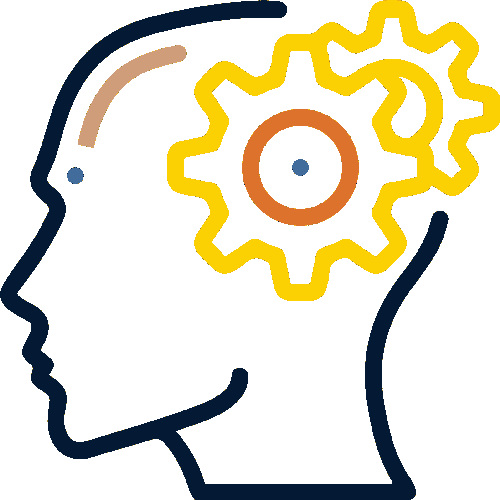If you are currently battling alcohol or drug dependency, you should know that Northern Illinois Recovery Center offers various substance abuse treatment programs and therapies, including cognitive-behavioral therapy (CBT). Our addiction treatment targets your particular needs and also addresses the factors that have led to your substance use disorder (SUD).
With CBT, you can have the skills and strength you need to achieve lasting sobriety and overcome your addiction. The cognitive-behavioral therapists will teach the clients new skills and attitudes patients can use long-term that will help their substance use disorders. Cognitive-behavioral therapy assists individuals with strategies and coping skills.

The 3 Goals of CBT
- Change patterns of negative thinking: CBT restrains negative thoughts by revealing the motivations behind unhealthy behavior. The CBT therapist assists the patient in actively reteaching their brain on how to handle and think about emotions. Negative thought patterns can encourage drug use and addiction treatment.
- Change unhelpful patterns of behavior: CBT discourages negative actions and reinforces positive actions. Addictive behaviors stem from substance abuse or drug abuse. Negative thought patterns play a huge role in drug addiction and substance use.
- Teach coping skills: CBT encourages healthy coping strategies as a substitute for harmful behaviors. Instead of rashly and swiftly turning to alcohol, drugs, or any other addictive behavior, have a coping mechanism. When individuals are able to make wise choices, it helps with their addiction recovery.
Cognitive-behavioral therapy addresses problems and difficulties that you may be facing due to your past struggles. Our cognitive-behavioral approach can treat depression, co-occurring disorders or dual diagnosis, and drug or alcohol use. In CBT, we use the following to give you a more comprehensive addiction treatment:
- Sense
- Knowledge
- Understanding
- Behavioral therapy
An imbalance in one area can create another because of the relationship between your thoughts, actions, and mental health. We can discover this imbalance with CBT for drug abuse. Cognitive-behavioral therapy can help an individual overcome substance misuse and treat addiction.

Connections
They can also feed anxiety disorders and depressive disorders, which put a person at risk of developing a SUD to cope. Once this occurs, addictive behaviors are developed, and a person undergoes drug dependence. Cognitive-behavioral therapy for substance abuse excels in treating cocaine addiction, amongst various other addictions at our treatment centers.
Once you recognize these connections, you can begin to learn new skills to cope and manage your thoughts and emotions during therapy and afterward. CBT doesn’t just identify negative or erroneous thinking; it actively works to help individuals change their behaviors to be more positive. Building these foundations will help people as they leave treatment at our treatment centers and begin their life of sobriety.
Likewise, if you take drugs or drink alcohol in excess, it will affect your thoughts, emotions, and actions. The more drugs you take, the more your thoughts and actions will be connected to your addiction. Eventually, your mental state will fuel your addiction, and your addiction will drive you more deeply into a severe mental condition. That symbiotic relationship between the drug or alcohol and your mental state is what causes dependency. Cognitive-behavioral therapy work can expose these habits within a person, and assist them in changing for the better.
The Main Benefits of CBT
The foundation of cognitive-behavioral therapy rests on a few main principles. The main one is that people often develop faulty and negative thinking about themselves and the world. As these negative thoughts take root over time, they become a part of the person’s emotional state. Consequently, negative thoughts influence how a person feels and responds to the world and others and lead to harmful behavior.
Through a cognitive-behavioral therapy program, the therapist works to help the person identify the negative thinking, and then they expose it to the person. During CBT, the therapist challenges your false thoughts and helps replace them with more accurate, positive ones.
Sometimes you may not know why you act or feel the way you do. Have you ever got upset, stressed, or even angry and then later wondered why you felt the way you did? It’s easy to act in ways we regret when we feel stressed or angry too. The fact is something from the past could be triggering our emotions, and thereby our actions follow.
If you find you’re always responding and reacting to situations without realizing why then a CBT program will benefit you by delving into the core issue of your problem. Instead of reacting all the time to things without understanding why you will begin to understand what drives those thoughts. As you gain understanding, you will also get better control over these actions.
When you do the work of cognitive-behavioral therapy or CBT, you can get to the core of your addiction issues. You’ll understand what drove you to use drugs in the first place. Often, individuals abuse drugs or alcohol due to some underlying mental health issues such as anxiety or depression or because of stressors at work, school, or within their family.
The opportunity to become a more rational person. CBT helps you think rationally about situations and problems when they appear instead of immediately thinking about a worst-case scenario. This not only helps avoid negative emotions but also helps you solve the problem more efficiently and effectively.
Rational thinking also leads to more controlled thinking. You have a better grasp of your thoughts and emotions when you face negative issues or situations. You can use your new coping mechanisms to work past the problem rather than turning to substance use to cope with it. As a result of having a better attitude and thought processes, you will think about yourself in a positive way and end the negative patterns in your thinking. By incorporating these operant learning strategies and mental health services, positive change will form for the better.
CBT has an emphasis on relapse prevention. Individuals who misuse alcohol and other drugs experience relapse incidents often. CBT therapists teach clients new attitudes and skills to depend on in the long term. This improves the person’s feeling of self-reliance, but it also leads to reducing life pressures that increase the risk of relapse.
Cognitive Behavioral Therapy for Alcoholism
Some of the impairments caused by alcohol include:
- Difficulty walking
- Blurred vision
- Slowed reaction times
- Impaired memory
Clearly, alcohol affects the brain and some of these problems are detectable after only one or two drinks and stop when the drinking stops. Nevertheless, a person who is a heavy drinker for a long period of time may have a brain deficiency that lasts well after they achieve sobriety.
What CBT Does to the Brain
CBT for Substance Abuse
A cognitive-behavioral therapy program treats addiction by reducing the reinforcing effects of substances on behavior. It does this by building positive mental connections with abstinence and teaching coping skills.
CBT is also effective for other mental health conditions, which are often an underlying cause of substance abuse. People commonly try to self-soothe an undiagnosed mental illness by using substances. These disorders are frequently the deep-seated cause of SUD:
- Bipolar disorder
- Depression
- PTSD (post-traumatic stress disorder)
- Anxiety disorders
- Physical illnesses like chronic pain
Cognitive Behavioral Therapy Services We Provide
To help you overcome some of your deepest struggles, we provide a comprehensive cognitive-behavioral therapy service that includes:
- Mind pattern restructuring
- Positive activity scheduling
- Fear exposure therapy
- Goal setting and achievement
- Mindfulness meditation
- Skills training and problem-solving
Additionally, a cognitive behavioral therapy program is highly effective at treating different psychological problems and disorders. Numerous CBT exercises such as those listed above are developing to help you overcome some of your most significant challenges. CBT is one form of therapy we offer across all our treatment programs, which include:
- Drug and alcohol detox
- Residential treatment
- Partial hospitalization program (PHP)
- Intensive outpatient program (IOP)
- Telehealth IOP
- Outpatient treatment
- Structured sober living
- Aftercare
Whether you or a loved one is in our men’s, women’s, or young adult rehab, CBT can be a great help in recovering from a SUD.

What Type of Disorders Can CBT Treat?
- Depression and anxiety
- PTSD
- Sleeping and eating disorders
- Obsessive-compulsive disorder (OCD)
- Drug or alcohol abuse
- Bipolar disorder
Likewise, an individualized treatment plan is also effective for patients that suffer from phobias, schizophrenia, and sexual disorders.
Lastly, Northern Illinois Recovery Center specialists take a hands-on and structured approach to cognitive-behavioral therapy. This gives us a unique perspective and an empathetic approach to helping you overcome your mental conditions. We offer CBT as part of our overall substance abuse treatment program, which also includes extended care, outpatient services, co-occurring disorder treatment, medication-assisted programs, and other evidence-based treatments.
Contact Northern Illinois Recovery Center Today to Learn More
- Dialectical behavior therapy
- Family therapy
- Group therapy
- Yoga therapy
- Trauma therapy
Contact us today to schedule a consultation with one of our clinicians and to find out more about the treatment programs we offer at Northern Illinois Recovery Center. We can answer your questions, go over your treatment options, and tell you more about our individual therapy program.
We are here to help you get back on the road to recovery and we understand that it is a road that demands expert help and guidance along the way. Our addiction therapy services are extensive, offering the best chance for healing. We’ll help you get the best opportunity for a full and lasting recovery.





